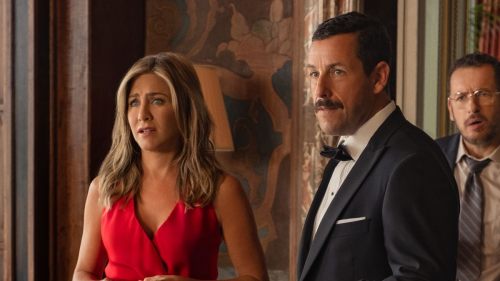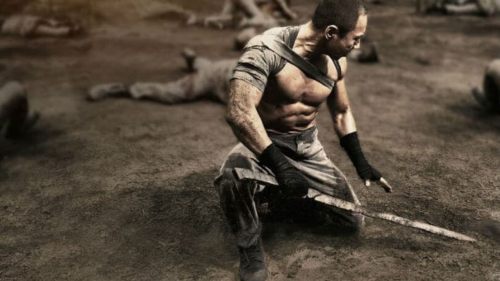BOJACK HORSEMAN Season Five Review – The Abyss
The world has an anti-hero problem. Television, as a vehicle for empathy and emulation, has trained us to instinctively identify with its protagonists. It’s a key part of long-form storytelling – if we’re going to go on an extended journey with a character, we have to have a reason. We have to care. That means that we invest with characters long-term, despite the fact that they may be genuinely awful people. We put Tony Soprano pictures up on the wall. We buy Walter White action figures. We see Don Draper-driven spikes in whiskey and cigarette sales. These are all complex, powerful portrayals in brilliant, groundbreaking shows, but all-too-often it is too easy to skim along the surface with these monstrous individuals, ignoring the social rot that their very existences symbolize. The best shows, like Bojack Horseman, are the ones that struggle the most with this, because they invite us to struggle too.
It feels good to identify with the flaws of others, perhaps even the darkest of them, and to see the roiling emotions within another human being as a show like Bojack Horseman has always invited. It’s something that the show, now in its fifth season, continues to wrestle with, as the ethics of such an act become more troubling. More than ever, the show that has never been afraid to laugh at itself, gaze inward, or make extremely pointed parallels to our current situation, is becoming aware of its place in the (generally white, male) anti-hero television canon. Bojack has never shied away from the big, existential questions, but this season operates more as a sustained ethical and moral freakout than ever before.
In the new season, the lines between truth and reality blur from the outset for Bojack, as his professional and personal worlds become hopelessly entangled by his role in a new show called ‘Philbert’, about a troubled, anti-heroic detective in a dark and hopeless world. Philbert is a doppelganger for Bojack in more ways than one. Bojack wanders around Hollywoo in his costume, and the set of ‘Philbert’ so closely mirrors his own home that it’s the source of a recurring gag. The show is keenly aware that in its commitment to actual emotional and spiritual stakes at the expense of simply being a silly animal comedy show, Bojack’s antiheroism essentially makes the show itself a target of the same legitimate criticisms of the Sopranos, Mad Mens and Breaking Bads of this world. The show-within-a-show format that season five dives into ensures that we never forget this comparison, in ways that are frequently uncomfortable to both the viewer and the fabric of the show itself.
Bojack Horseman’s most consistent cultural parallel is Mad Men – a show that similarly captured the wayward attempts of terrible people trying and failing to become better in a society that rewards their worst vices. This season of Bojack reminded me strongly of that show’s sixth, and most maligned, season. This isn’t meant as criticism however – this season of Bojack, while arguably not achieving the individual emotional highs of earlier seasons, is perhaps the most focused, structured and disciplined season of the series. What strikes me as familiar here is the sense of weariness, of having totally had enough of the bullshit of the main character, as Mad Men’s sixth did. Like that season, this installment of Bojack is focused on deconstructing the myth of Bojack Horseman – of pulling back the sheen of appreciation we feel that makes us blind to the very real flaws of the man in front of us. In Mad Men, this deconstruction was necessary to send our central character on a long, extremely rocky path to redemption, and perhaps some sort of spiritual peace. Whether the same will be said of Bojack’s fifth season when we reach the end of this story is yet to be seen.
This is perhaps the least-funny of Bojack’s five seasons – though there are undoubtedly riotous moments throughout. The voice-work remains astonishingly strong (Will Arnett, take a bow), the detail and design of this crazy world is possibly even more intricate than ever, and its writing is still exquisitely sharp and laden with the witticisms and cutting real-world comparisons that make this the most well-written show in Netflix’s stable. And yet, I watched much of this season with a squirm-inducing grimace, rather than a smile or a giant, cathartic sob. Bojack in this season does the hard, messy task of calling its chickens home to roost, in the meantime unleashing a reckoning on all its characters that is both blisteringly timely and inevitable in a way that the audience (and perhaps the writers themselves) had long hoped to avoid. That messy, difficult act of cleaning out the closet is precisely what makes this season of Bojack such an important and masterful piece of work – precisely because it is textbook ‘bad’ television writing.
What I mean by this is that the fifth season of Bojack actively ‘punishes’ both the show and the viewer for caring. Far from mean-spirited, this in fact invites extended periods of reflection, and of grieving – like Bojack has grieved all his life for the happiness he never, ever received. It’s grieving for those extended bouts of emotional purging and fragile feelings of hope that allowed us to ignore the things we knew were wrong and desperately tried to avoid. It’s a situation that reflects the spiritual crisis a lot of us are facing right now - coming to terms with the things we willfully ignored and trying to take responsibility for those things.
Written on a whiteboard in the writers room of ‘Philbert’ is, rather hilariously, the name ‘NIETZSCHE’ with a big red circle around it. The joke is obvious – of course the self-serious, ridiculously morose ‘important television drama’ would be obsessed with Nietzsche (then later ‘Bukowski’). And yet, in the corner of the same room is written Nietzsche's most famous quote – ‘He who fights with monsters might take care lest he thereby become a monster. And if you gaze for long into an abyss, the abyss gazes also into you.’ The reason for continued focus on this quote is made clear in Bojack’s latest season - the show itself, in trying to fight the anti-heroes of this world, and present as comedy the social evils that plague our modern landscape, may have morphed into something upsettingly similar. Bojack, near the end of the season, on the tail-end of a particularly devastating opioid bender that represents a point-of-no-return for the show and the character, wanders into a poorly drawn world, where a giant, inflatable balloon version of himself floats, waiting for him. He stares at the abyss, this monumental recreation of himself, the grand image of Bojack that the whole world sees.
And the abyss stares back.



